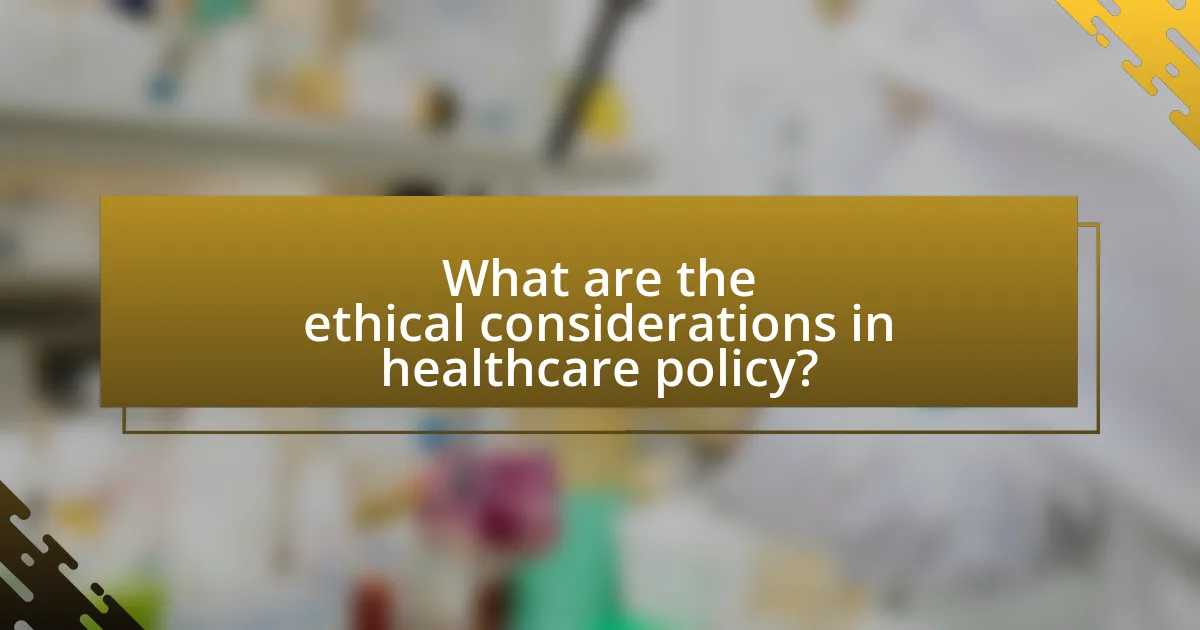The article focuses on ethical considerations in healthcare policy, emphasizing principles such as justice, beneficence, non-maleficence, and autonomy. It explores the importance of these ethical frameworks in guiding policy decisions, enhancing patient care, and addressing disparities in healthcare access. The role of leading conferences in shaping ethical discussions and influencing policy-making is highlighted, along with the challenges of integrating ethics into healthcare policies. Additionally, the article examines the contributions of various stakeholders, including healthcare professionals and advocacy groups, in promoting ethical standards and the impact of emerging trends and technology on ethical considerations in healthcare.

What are the ethical considerations in healthcare policy?
Ethical considerations in healthcare policy include principles such as justice, beneficence, non-maleficence, and autonomy. Justice ensures equitable access to healthcare resources, beneficence promotes the well-being of patients, non-maleficence emphasizes the obligation to avoid harm, and autonomy respects patients’ rights to make informed decisions about their care. These principles guide policymakers in creating frameworks that prioritize ethical standards, as evidenced by the World Health Organization’s emphasis on universal health coverage and ethical resource allocation in its 2019 report.
Why are ethical considerations important in healthcare policy?
Ethical considerations are crucial in healthcare policy because they ensure that decisions respect patient rights, promote fairness, and enhance trust in the healthcare system. These considerations guide policymakers in addressing issues such as access to care, informed consent, and the equitable distribution of resources. For instance, the Belmont Report outlines ethical principles for research involving human subjects, emphasizing respect for persons, beneficence, and justice, which are foundational to ethical healthcare practices. By integrating ethical frameworks, healthcare policies can better align with societal values and improve health outcomes, ultimately fostering a more just and effective healthcare system.
What ethical principles guide healthcare policy decisions?
Ethical principles that guide healthcare policy decisions include autonomy, beneficence, non-maleficence, and justice. Autonomy emphasizes the right of individuals to make informed decisions about their own healthcare. Beneficence requires that healthcare policies promote the well-being of patients, while non-maleficence mandates that policies should avoid causing harm. Justice focuses on the fair distribution of healthcare resources and equitable access to care. These principles are foundational in shaping policies that respect individual rights and promote overall public health, as evidenced by frameworks established by organizations such as the World Health Organization and the American Medical Association.
How do ethical considerations impact patient care and outcomes?
Ethical considerations significantly impact patient care and outcomes by guiding healthcare professionals in making decisions that prioritize patient welfare, autonomy, and justice. These principles ensure that patients receive respectful and equitable treatment, which can lead to improved health outcomes and patient satisfaction. For instance, adherence to ethical guidelines in informed consent processes enhances patient autonomy, allowing individuals to make informed decisions about their care, which has been shown to correlate with better adherence to treatment plans and overall health outcomes. Additionally, ethical frameworks help address disparities in healthcare access, ensuring that vulnerable populations receive appropriate care, thereby improving public health metrics.
What role do leading conferences play in discussing ethical considerations?
Leading conferences play a crucial role in discussing ethical considerations by providing a platform for experts to share insights, debate issues, and establish guidelines. These conferences facilitate interdisciplinary dialogue among healthcare professionals, ethicists, policymakers, and researchers, fostering a comprehensive understanding of ethical dilemmas in healthcare. For instance, the American Medical Association’s annual meeting often addresses pressing ethical issues, such as patient autonomy and resource allocation, influencing national healthcare policies. By synthesizing diverse perspectives, leading conferences contribute to the development of ethical frameworks that guide practice and policy in healthcare settings.
Which conferences are recognized for their focus on healthcare ethics?
The conferences recognized for their focus on healthcare ethics include the American Society for Bioethics and Humanities (ASBH) Annual Meeting, the World Congress of Bioethics, and the National Conference on Bioethics. These conferences are platforms where professionals discuss ethical issues in healthcare, share research, and develop guidelines for ethical practices. For instance, the ASBH Annual Meeting has been held annually since 1998, bringing together bioethicists, healthcare professionals, and policymakers to address contemporary ethical challenges in healthcare.
How do these conferences influence policy-making in healthcare?
Conferences influence policy-making in healthcare by facilitating dialogue among stakeholders, including policymakers, healthcare professionals, and researchers. These gatherings provide a platform for sharing evidence-based practices, discussing ethical considerations, and highlighting emerging health issues, which can directly inform legislative and regulatory decisions. For instance, the World Health Assembly often leads to the adoption of global health policies based on discussions held during its sessions, demonstrating the tangible impact of conference deliberations on healthcare policy.
What challenges arise in integrating ethics into healthcare policy?
Integrating ethics into healthcare policy faces several challenges, including conflicting values among stakeholders, the complexity of ethical frameworks, and the dynamic nature of healthcare needs. Conflicting values arise when different stakeholders, such as patients, providers, and policymakers, prioritize various ethical principles like autonomy, justice, and beneficence, leading to disagreements on policy direction. The complexity of ethical frameworks complicates decision-making, as there is often no single ethical approach that can be universally applied to diverse healthcare scenarios. Additionally, the dynamic nature of healthcare, influenced by technological advancements and changing societal norms, requires continuous ethical reassessment, making it difficult to establish stable policies. These challenges highlight the need for ongoing dialogue and collaboration among stakeholders to effectively integrate ethics into healthcare policy.
What are common ethical dilemmas faced by policymakers?
Common ethical dilemmas faced by policymakers include balancing public health needs with individual rights, ensuring equitable access to healthcare, and managing limited resources. Policymakers often struggle with the tension between implementing policies that benefit the majority while respecting the rights of minorities. For instance, during the COVID-19 pandemic, decisions regarding vaccine distribution highlighted the challenge of prioritizing vulnerable populations without neglecting others. Additionally, the allocation of healthcare resources, such as funding and services, raises ethical questions about fairness and justice, as seen in debates over universal healthcare systems. These dilemmas require careful consideration of ethical principles, such as beneficence, non-maleficence, and justice, to guide decision-making in complex healthcare environments.
How can stakeholders address these ethical challenges?
Stakeholders can address ethical challenges in healthcare policy by implementing transparent decision-making processes and engaging in collaborative dialogue with affected communities. This approach ensures that diverse perspectives are considered, fostering trust and accountability. For instance, the World Health Organization emphasizes the importance of stakeholder engagement in health policy to enhance ethical standards and improve health outcomes. By actively involving patients, healthcare providers, and policymakers in discussions, stakeholders can identify ethical dilemmas and develop solutions that reflect shared values and priorities.

How do different stakeholders contribute to ethical discussions in healthcare policy?
Different stakeholders contribute to ethical discussions in healthcare policy by bringing diverse perspectives, expertise, and values that shape decision-making processes. Healthcare providers, such as doctors and nurses, offer insights based on clinical experience and patient care ethics, while patients and advocacy groups highlight the importance of patient rights and needs. Policymakers and government officials provide regulatory frameworks and public health considerations, ensuring that policies align with societal values and legal standards. Academic researchers contribute evidence-based findings that inform ethical debates, while industry representatives, including pharmaceutical companies, advocate for innovation and economic viability. This multi-faceted engagement fosters comprehensive discussions that address ethical dilemmas, as evidenced by the collaborative efforts seen in conferences like the World Health Assembly, where stakeholders collectively address global health challenges and ethical implications.
What perspectives do healthcare professionals bring to ethical discussions?
Healthcare professionals bring diverse perspectives to ethical discussions, shaped by their clinical experience, patient interactions, and understanding of medical ethics. These perspectives include a focus on patient autonomy, beneficence, non-maleficence, and justice, which guide their decision-making processes. For instance, healthcare providers often advocate for patient-centered care, emphasizing the importance of informed consent and respecting patients’ wishes. Additionally, their firsthand experience with the consequences of healthcare policies allows them to highlight practical implications and ethical dilemmas that may arise in real-world scenarios. This combination of ethical principles and practical insights ensures that discussions are grounded in both theory and practice, ultimately leading to more informed and balanced healthcare policies.
How do physicians’ experiences shape ethical considerations in policy?
Physicians’ experiences significantly shape ethical considerations in policy by providing firsthand insights into patient care, medical challenges, and healthcare system limitations. These experiences inform their understanding of ethical dilemmas, such as resource allocation, patient autonomy, and informed consent, which are critical in policy formulation. For instance, a study published in the Journal of Medical Ethics highlights how physicians’ encounters with end-of-life care influence their perspectives on policies regarding palliative care and euthanasia. This direct involvement allows physicians to advocate for policies that reflect the realities of clinical practice and patient needs, ensuring that ethical considerations are grounded in practical experience.
What role do nurses play in advocating for ethical practices?
Nurses play a critical role in advocating for ethical practices by ensuring patient rights and promoting ethical standards in healthcare. They serve as patient advocates, communicating patients’ needs and preferences to the healthcare team, which is essential for informed consent and shared decision-making. Additionally, nurses are often involved in ethical committees and discussions, where they contribute their frontline perspectives on patient care, thereby influencing policy and practice. Research indicates that nurses’ involvement in ethical decision-making leads to improved patient outcomes and satisfaction, highlighting their importance in fostering an ethical healthcare environment.
How do patients and advocacy groups influence ethical healthcare policies?
Patients and advocacy groups influence ethical healthcare policies by actively participating in policy discussions, providing firsthand experiences, and advocating for specific changes that reflect their needs and values. Their involvement often leads to the incorporation of patient-centered care principles into policy frameworks, ensuring that ethical considerations align with the realities faced by patients. For instance, advocacy groups have successfully lobbied for legislation that addresses issues such as access to care, informed consent, and the right to participate in treatment decisions, thereby shaping policies that prioritize ethical standards in healthcare delivery.
What are the key concerns of patients regarding healthcare ethics?
Key concerns of patients regarding healthcare ethics include issues of informed consent, confidentiality, and equitable access to care. Patients often worry that they may not fully understand the risks and benefits of treatments, which can lead to ethical dilemmas in decision-making. Additionally, the protection of personal health information is a significant concern, as breaches can undermine trust in healthcare providers. Furthermore, patients express anxiety about disparities in healthcare access, emphasizing the need for fair treatment regardless of socioeconomic status. These concerns are supported by studies indicating that ethical considerations significantly impact patient satisfaction and trust in the healthcare system.
How can advocacy groups effectively promote ethical standards?
Advocacy groups can effectively promote ethical standards by engaging in public education campaigns that raise awareness about ethical issues in healthcare. These campaigns can utilize various media platforms to disseminate information, share personal stories, and highlight the importance of ethical practices, thereby influencing public opinion and policy. For instance, the American Medical Association has successfully used advocacy to promote ethical standards by developing guidelines and resources that inform both healthcare professionals and the public about ethical dilemmas in medicine. This approach not only educates stakeholders but also fosters a culture of accountability and transparency within the healthcare system.
What is the impact of government and regulatory bodies on healthcare ethics?
Government and regulatory bodies significantly shape healthcare ethics by establishing laws, guidelines, and standards that govern medical practices and patient care. These entities, such as the Food and Drug Administration (FDA) and the Centers for Medicare & Medicaid Services (CMS), enforce regulations that ensure patient safety, informed consent, and equitable access to healthcare services. For instance, the Health Insurance Portability and Accountability Act (HIPAA) sets strict privacy standards for patient information, reinforcing ethical obligations to protect patient confidentiality. Furthermore, government oversight can promote ethical practices by holding healthcare providers accountable for malpractice and ensuring compliance with ethical standards, thereby fostering trust in the healthcare system.
How do regulations shape ethical practices in healthcare?
Regulations shape ethical practices in healthcare by establishing standards that govern the behavior of healthcare providers and institutions. These regulations, such as the Health Insurance Portability and Accountability Act (HIPAA) and the Affordable Care Act (ACA), enforce compliance with ethical norms related to patient privacy, informed consent, and equitable access to care. For instance, HIPAA mandates the protection of patient information, thereby promoting trust and confidentiality in the patient-provider relationship. Additionally, the ACA includes provisions that aim to reduce disparities in healthcare access, reinforcing the ethical principle of justice. By setting these legal frameworks, regulations ensure that ethical considerations are integrated into everyday healthcare practices, ultimately guiding providers in their decision-making processes.
What are the consequences of failing to adhere to ethical guidelines?
Failing to adhere to ethical guidelines in healthcare can lead to severe consequences, including legal repercussions, loss of professional credibility, and harm to patients. Legal repercussions may involve lawsuits or disciplinary actions from regulatory bodies, which can result in fines or loss of licensure. Loss of professional credibility occurs when healthcare providers violate trust, leading to diminished patient relationships and potential loss of clientele. Additionally, harm to patients can manifest as inadequate care, medical errors, or breaches of confidentiality, which can have lasting negative impacts on patient health and wellbeing. These consequences underscore the critical importance of maintaining ethical standards in healthcare practices.

What are the emerging trends in ethical considerations in healthcare policy?
Emerging trends in ethical considerations in healthcare policy include a focus on equity in access to care, the integration of artificial intelligence in decision-making, and the prioritization of patient autonomy. Equity in access is increasingly recognized as essential, with policies aimed at reducing disparities in healthcare outcomes among different populations. The integration of artificial intelligence raises ethical questions about bias and accountability, prompting discussions on the need for transparent algorithms and oversight. Additionally, patient autonomy is being emphasized, with policies advocating for informed consent and shared decision-making, reflecting a shift towards respecting individual rights in healthcare choices. These trends are supported by findings from recent conferences, such as the World Health Organization’s discussions on universal health coverage and the ethical implications of technology in healthcare.
How is technology influencing ethical discussions in healthcare?
Technology is significantly influencing ethical discussions in healthcare by introducing complex dilemmas related to data privacy, patient consent, and equitable access to care. The integration of electronic health records and telemedicine raises concerns about the confidentiality of patient information and the potential for misuse of data. For instance, a study published in the Journal of Medical Internet Research highlights that 60% of patients express concerns about their data being shared without consent. Additionally, advancements in artificial intelligence and machine learning in diagnostics prompt ethical questions regarding accountability and bias in decision-making processes. The World Health Organization emphasizes the need for ethical frameworks to address these challenges, ensuring that technology enhances rather than undermines patient rights and equity in healthcare access.
What ethical issues arise from the use of artificial intelligence in healthcare?
The ethical issues arising from the use of artificial intelligence in healthcare include concerns about patient privacy, algorithmic bias, accountability, and informed consent. Patient privacy is compromised when AI systems process sensitive health data, potentially leading to unauthorized access or misuse. Algorithmic bias occurs when AI models are trained on non-representative data, resulting in unequal treatment outcomes for different demographic groups. Accountability is a significant issue, as it can be unclear who is responsible for errors made by AI systems—whether it is the developers, healthcare providers, or the institutions using the technology. Informed consent becomes complex when patients may not fully understand how AI systems will be used in their care, raising questions about their autonomy and decision-making rights. These ethical concerns have been highlighted in discussions at leading healthcare conferences, emphasizing the need for robust ethical frameworks to guide AI implementation in healthcare settings.
How does telemedicine challenge traditional ethical frameworks?
Telemedicine challenges traditional ethical frameworks by introducing complexities in patient-provider relationships, confidentiality, and informed consent. Traditional frameworks often rely on in-person interactions, which facilitate trust and clear communication; however, telemedicine can create barriers to these essential elements. For instance, the lack of physical presence may hinder the establishment of rapport, potentially affecting the quality of care and ethical obligations to patients. Additionally, telemedicine raises concerns about data security and privacy, as sensitive health information is transmitted electronically, increasing the risk of breaches. The American Medical Association has highlighted these issues, emphasizing the need for updated ethical guidelines that address the unique challenges posed by telemedicine, such as ensuring informed consent in a virtual environment and maintaining patient confidentiality amidst technological vulnerabilities.
What role does global health play in shaping ethical healthcare policies?
Global health plays a crucial role in shaping ethical healthcare policies by providing a framework for understanding health disparities and promoting equitable access to healthcare. This framework emphasizes the interconnectedness of health issues across borders, highlighting the need for policies that address social determinants of health, such as poverty and education. For instance, the World Health Organization’s Commission on the Social Determinants of Health has documented that addressing these determinants can lead to improved health outcomes and reduced inequalities. By integrating global health perspectives, policymakers can create ethical guidelines that prioritize the well-being of vulnerable populations, ensuring that healthcare systems are just and inclusive.
How do international guidelines influence national healthcare policies?
International guidelines significantly influence national healthcare policies by providing a framework for best practices and standards that countries can adopt. These guidelines, often developed by organizations such as the World Health Organization, serve as benchmarks for quality and safety in healthcare delivery. For instance, the WHO’s Global Strategy on Human Resources for Health emphasizes the need for countries to align their workforce policies with international standards to improve health outcomes. This alignment can lead to the adoption of evidence-based practices, which are crucial for enhancing the effectiveness of national healthcare systems. Furthermore, countries that integrate these guidelines into their policies often experience improved health metrics, as seen in nations that have implemented WHO recommendations on vaccination and disease prevention, resulting in reduced morbidity and mortality rates.
What ethical considerations are unique to global health initiatives?
Global health initiatives face unique ethical considerations, primarily due to the diverse cultural, economic, and political contexts in which they operate. These initiatives often involve balancing the needs of populations in low-resource settings with the ethical obligation to respect local customs and values. For instance, the principle of justice requires equitable access to healthcare resources, which can be challenging when disparities exist between countries. Additionally, informed consent becomes complex in global health, as varying levels of education and health literacy can affect individuals’ understanding of risks and benefits associated with interventions. The World Health Organization emphasizes the importance of cultural sensitivity and community engagement in addressing these ethical dilemmas, highlighting that ethical frameworks must be adaptable to local contexts to ensure respect for human rights and dignity.
What best practices can be adopted for ethical healthcare policy development?
Best practices for ethical healthcare policy development include stakeholder engagement, transparency, and evidence-based decision-making. Stakeholder engagement ensures that diverse perspectives, including those of patients, healthcare providers, and community members, are considered, which enhances the legitimacy and acceptance of policies. Transparency in the policymaking process fosters trust and accountability, allowing stakeholders to understand how decisions are made. Evidence-based decision-making relies on robust data and research to inform policies, ensuring that they are effective and equitable. For instance, the World Health Organization emphasizes the importance of these practices in its guidelines for health policy development, highlighting that inclusive and transparent processes lead to better health outcomes and increased public trust.
How can policymakers ensure stakeholder engagement in ethical discussions?
Policymakers can ensure stakeholder engagement in ethical discussions by implementing structured frameworks for participation that include diverse stakeholder representation. Engaging stakeholders through public consultations, focus groups, and advisory committees allows for a variety of perspectives to be considered, which is essential for ethical decision-making in healthcare policy. Research indicates that inclusive engagement leads to more comprehensive and accepted policy outcomes, as seen in the 2018 study by the National Academy of Medicine, which highlighted that stakeholder involvement enhances the legitimacy and effectiveness of health policies.
What strategies can be implemented to promote ethical decision-making in healthcare?
To promote ethical decision-making in healthcare, organizations can implement strategies such as establishing ethics committees, providing ethics training, and fostering a culture of open communication. Ethics committees serve as a resource for healthcare professionals to consult on complex cases, ensuring that decisions align with ethical standards. Research indicates that healthcare institutions with active ethics committees report higher levels of ethical awareness among staff (American Medical Association, 2020). Additionally, regular ethics training equips healthcare providers with the tools to navigate ethical dilemmas effectively, enhancing their decision-making skills. A study published in the Journal of Medical Ethics found that ongoing education significantly improves ethical reasoning in clinical practice (Beauchamp & Childress, 2019). Finally, promoting a culture of open communication encourages staff to voice ethical concerns without fear of retribution, leading to more transparent and accountable decision-making processes.

Leave a Reply